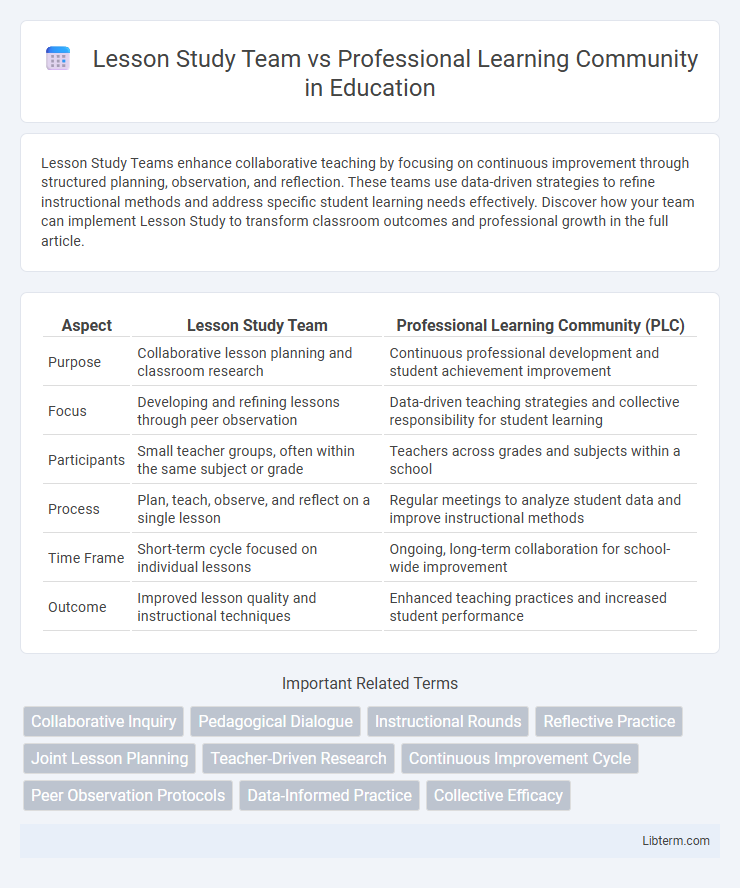Lesson Study Teams enhance collaborative teaching by focusing on continuous improvement through structured planning, observation, and reflection. These teams use data-driven strategies to refine instructional methods and address specific student learning needs effectively. Discover how your team can implement Lesson Study to transform classroom outcomes and professional growth in the full article.
Table of Comparison
| Aspect | Lesson Study Team | Professional Learning Community (PLC) |
|---|---|---|
| Purpose | Collaborative lesson planning and classroom research | Continuous professional development and student achievement improvement |
| Focus | Developing and refining lessons through peer observation | Data-driven teaching strategies and collective responsibility for student learning |
| Participants | Small teacher groups, often within the same subject or grade | Teachers across grades and subjects within a school |
| Process | Plan, teach, observe, and reflect on a single lesson | Regular meetings to analyze student data and improve instructional methods |
| Time Frame | Short-term cycle focused on individual lessons | Ongoing, long-term collaboration for school-wide improvement |
| Outcome | Improved lesson quality and instructional techniques | Enhanced teaching practices and increased student performance |
Introduction to Collaborative Teacher Development
Lesson Study Teams emphasize iterative, research-based lesson planning and peer observation, fostering in-depth collaboration centered on student learning outcomes. Professional Learning Communities (PLCs) focus on collective inquiry and shared practices to improve teaching effectiveness across broader school contexts. Both models promote collaborative teacher development but differ in structure, with Lesson Study adopting a cyclical, lesson-focused approach and PLCs emphasizing ongoing dialogue and organizational improvement.
Defining Lesson Study Teams
Lesson Study Teams are collaborative groups of educators focused on systematically improving teaching practices through iterative lesson planning, classroom observation, and reflective discussions. These teams engage in a cycle of identifying learning goals, designing research lessons, observing their implementation, and analyzing student outcomes to enhance instructional effectiveness. Unlike broader Professional Learning Communities, Lesson Study Teams emphasize in-depth examination of specific lessons to drive targeted pedagogical improvement.
Understanding Professional Learning Communities (PLC)
Professional Learning Communities (PLC) emphasize sustained collaboration among educators to improve student learning through shared goals, collective inquiry, and continuous improvement cycles. Unlike Lesson Study Teams, which concentrate on co-planning and observing specific lessons, PLCs foster a broader culture of ongoing professional development and data-driven decision-making across entire schools or districts. The core components of PLCs include a focus on student outcomes, collaborative team structures, and reflective practice that drives instructional refinement.
Core Principles: Lesson Study vs PLC
Lesson Study centers on collaborative, cyclical inquiry where educators jointly plan, observe, and analyze actual classroom lessons to enhance teaching practices and student learning. Professional Learning Communities (PLCs) emphasize continuous teamwork focused on shared goals, collective responsibility, and data-driven decision-making to improve student outcomes across multiple classrooms or grades. Core principles of Lesson Study involve iterative lesson refinement and reflective practice, whereas PLCs prioritize sustained collaboration, shared leadership, and school-wide culture shifts.
Structure and Process Comparison
Lesson Study Teams center on collaborative planning, observation, and reflection cycles within a small group of teachers focusing on a single lesson's improvement. Professional Learning Communities consist of broader, ongoing collaboration among staff with shared goals, continuous data analysis, and collective responsibility for student achievement. Lesson Study emphasizes iterative lesson refinement through direct classroom observation, while PLCs prioritize systemic inquiry and collective decision-making for school-wide instructional improvement.
Goals and Outcomes of Each Approach
Lesson Study Teams focus on collaborative lesson planning, observation, and reflection to improve instructional strategies and student learning outcomes through cyclical, data-driven inquiry. Professional Learning Communities emphasize ongoing teacher collaboration to enhance school culture, share best practices, and promote continuous professional growth aligned with broader educational goals. Both approaches aim to elevate student achievement but prioritize distinct processes: Lesson Study centers on refining specific lessons, while PLCs target systemic improvements in teaching and learning practices.
Roles and Responsibilities of Participants
In a Lesson Study Team, participants collaboratively design, observe, and analyze lessons with the primary roles of teacher-researchers focused on continuous instructional improvement. Professional Learning Community (PLC) members engage in shared practices emphasizing collective inquiry, data-driven decision-making, and mutual accountability, with roles distributed among facilitators, data analysts, and teacher-leaders. Both frameworks require active participation and reflective dialogue, but Lesson Study centers on deep lesson-level investigation while PLCs target broader school-wide professional development and student achievement goals.
Impact on Teaching Practice
Lesson Study Teams foster continuous improvement through collaborative lesson planning, observation, and reflection, directly enhancing teaching strategies and classroom effectiveness. Professional Learning Communities emphasize sustained collective inquiry and shared responsibility, promoting consistent implementation of best practices and student-centered learning. Both approaches significantly impact teaching practice by encouraging collaborative refinement, but Lesson Study offers a cyclical, focused approach to lesson improvement.
Challenges and Best Practices
Lesson Study Teams face challenges such as coordinating schedules, ensuring consistent participation, and addressing diverse teaching practices, while Professional Learning Communities often struggle with maintaining sustained engagement, aligning goals across departments, and managing differing expectations. Best practices for Lesson Study Teams include structured observation cycles, collaborative reflection sessions, and focusing on specific student learning outcomes, whereas Professional Learning Communities benefit from shared leadership, clear communication protocols, and ongoing professional development aligned with school-wide objectives. Both models emphasize the importance of a supportive culture, data-driven decision-making, and continuous feedback to overcome challenges and enhance instructional effectiveness.
Choosing the Right Model for Your School
Lesson Study Teams emphasize collaborative lesson planning and iterative improvement focused on student learning outcomes, making them ideal for schools prioritizing deep instructional refinement. Professional Learning Communities (PLCs) foster broader cultural shifts through ongoing collaboration, data analysis, and shared leadership aimed at overall school improvement. Selecting the right model depends on your school's specific goals, resources, and readiness for change--Lesson Study suits targeted teaching practice enhancements, while PLCs support systemic, long-term collaboration.
Lesson Study Team Infographic

 libterm.com
libterm.com